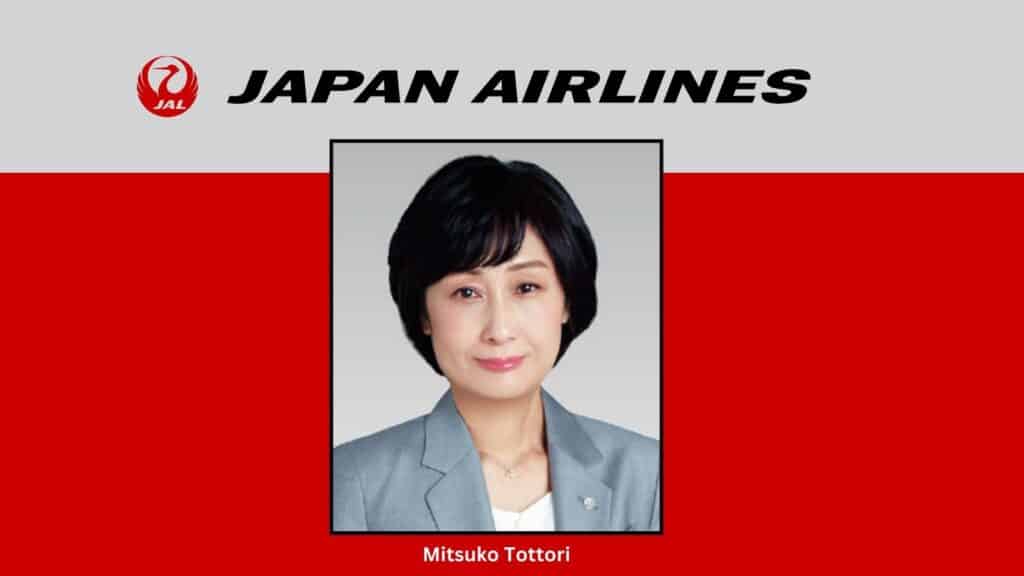Japan Airlines Appoints Mitsuko Tottori as First Female President. Does This Signal A Step Forward For Japan and Gender Equality?
In a historic move, Japan Airlines has appointed Mitsuko Tottori as its first female president, marking a significant milestone for both the airline and gender equality in Japan’s corporate landscape.
Mitsuko Tottori: A Trailblazer
Mitsuko Tottori, born on December 31, 1964, has been named as Representative Director and Senior Managing Executive Officer of Japan Airlines. Her career within the company demonstrates her commitment and leadership capabilities.
You can read the press memo here.

Career Highlights
Tottori’s tenure at Japan Airlines began in April 1985, initiating a distinguished professional journey. Over the years, she held several key roles within the company, including Senior Director at the Cabin Attendants Office II, Vice President of the Narita Cabin Attendants II Department, and Executive Officer and Senior Vice President of the Cabin Attendants Division.
In April 2023, Tottori assumed the role of Senior Managing Executive Officer, further solidifying her position within the organization. Throughout her tenure, she demonstrated unwavering dedication to safe flight operations, employee development, and enhancing customer experience.
Nomination Rationale
Tottori’s nomination as Director is based on her extensive experience and exceptional leadership qualities. Her transition from a cabin attendant to a senior executive provided her with invaluable insights into safe flight operations and service. Throughout her tenure, Tottori displayed remarkable leadership, particularly amidst the challenges posed by the COVID-19 pandemic.
As Senior Vice President of the Cabin Attendants Division, Tottori played a pivotal role in maintaining safe operations while prioritizing employee motivation and development. Subsequently, her role as Senior Vice President of the Customer Experience Division further underscored her dedication to enhancing service quality and customer satisfaction.
Closing the Gender Gap in Corporate Japan
In the realm of corporate Japan, achieving gender parity remains an ongoing challenge. Despite efforts to address this issue, disparities persist, with women significantly underrepresented in key decision-making roles.
The Current Landscape
As of 2022, women hold only 11.4% of board positions in Japanese companies listed on the Tokyo Stock Exchange’s Prime Market, a stark contrast to Western economies where women comprise approximately 30% of board members. Moreover, women remain notably absent from middle management positions, with only 9% of managers in Japanese companies being female. These statistics underscore the pressing need for transformative change within Japan’s corporate culture.
Examining Potential Solutions
To address the gender gap, Japan has the opportunity to draw from two distinct models: the mandatory quota approach and the model of investor pressure. The European Union’s adoption of gender quotas, mandating that women occupy 40% of board seats in large companies by 2026, presents one viable strategy. Alternatively, Japan could heed the call of foreign investors advocating for board diversity, as exemplified by the notable increase in female board members among US companies.
The World Economic Forum released their Global Gender Gap Report 2023 ” The Global Gender Gap Index annually benchmarks the current state and evolution of gender parity across four key dimensions (Economic Participation and Opportunity, Educational Attainment, Health and Survival, and Political Empowerment). It is the longest-standing index tracking the progress of numerous countries’ efforts towards closing these gaps over time since its inception in 2006.” You can read it in full here.
Government Initiatives and Corporate Responses
Japanese Prime Minister Fumio Kishida has set ambitious targets for gender diversity, aiming for women to hold 30% of executive positions in prime-listed companies by 2030. Additionally, the Japan Business Federation has pledged to increase the proportion of women executives to 30% by 2030. However, the absence of penalties for non-compliance highlights the voluntary nature of these goals, signaling a need for stronger regulatory frameworks. And progress is sorely lacking as embarrassingly illustrated recentl when the Group of Seven (G7) nations gathered in Nikko, Japan for a two-day summit on women’s empowerment and gender equality on 24–25 June of 2023 and Japan sent the only male representative to the event. See photo of the blunder in this article.
The Role of Foreign Investors
Foreign investors have played a pivotal role in driving change within Japanese companies, advocating for increased board diversity and accountability. Through campaigns and shareholder activism, institutional investors and proxy advisors have pressured companies to prioritize gender equality as a critical component of sustainable growth.
Challenges and Opportunities
Despite progress, challenges persist, stemming from deeply ingrained cultural norms and organizational structures. Japan’s age-based promotion and pay systems present significant barriers to female advancement, highlighting the need for a paradigm shift towards merit-based practices. Additionally, the appointment of women to board positions must prioritize qualifications and expertise over superficial criteria, such as media visibility.
A Call to Action
As Japan navigates the complexities of gender diversity, it must move beyond token gestures towards substantive change. While the addition of women to corporate boards is a step in the right direction, true progress requires accountability, transparency, and a commitment to dismantling systemic barriers. By embracing meritocracy and fostering a culture of inclusivity, Japanese companies can unlock the full potential of their workforce and drive sustainable growth.
Conclusion
Mitsuko Tottori’s appointment as Japan Airlines’ first female president marks a significant milestone in the airline’s history. Her leadership, dedication, and trailblazing journey serve as an inspiration to aspiring leaders and advocates for gender equality across Japan.






